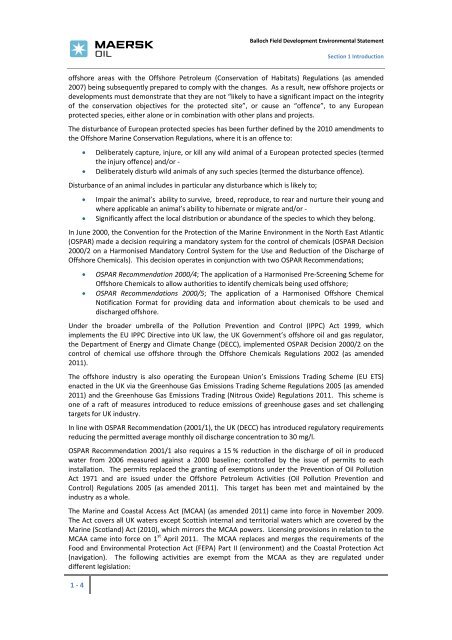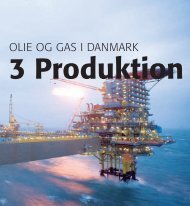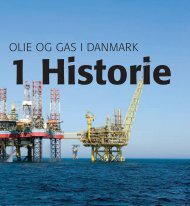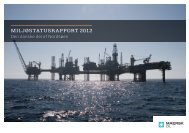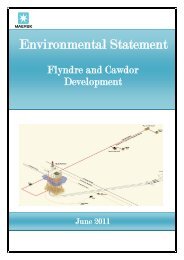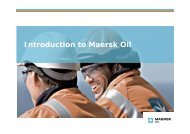Environmental Statement - Maersk Oil
Environmental Statement - Maersk Oil
Environmental Statement - Maersk Oil
Create successful ePaper yourself
Turn your PDF publications into a flip-book with our unique Google optimized e-Paper software.
1 ‐ 4<br />
Balloch Field Development <strong>Environmental</strong> <strong>Statement</strong><br />
Section 1 Introduction<br />
offshore areas with the Offshore Petroleum (Conservation of Habitats) Regulations (as amended<br />
2007) being subsequently prepared to comply with the changes. As a result, new offshore projects or<br />
developments must demonstrate that they are not “likely to have a significant impact on the integrity<br />
of the conservation objectives for the protected site”, or cause an “offence”, to any European<br />
protected species, either alone or in combination with other plans and projects.<br />
The disturbance of European protected species has been further defined by the 2010 amendments to<br />
the Offshore Marine Conservation Regulations, where it is an offence to:<br />
Deliberately capture, injure, or kill any wild animal of a European protected species (termed<br />
the injury offence) and/or ‐<br />
Deliberately disturb wild animals of any such species (termed the disturbance offence).<br />
Disturbance of an animal includes in particular any disturbance which is likely to;<br />
Impair the animal’s ability to survive, breed, reproduce, to rear and nurture their young and<br />
where applicable an animal’s ability to hibernate or migrate and/or ‐<br />
Significantly affect the local distribution or abundance of the species to which they belong.<br />
In June 2000, the Convention for the Protection of the Marine Environment in the North East Atlantic<br />
(OSPAR) made a decision requiring a mandatory system for the control of chemicals (OSPAR Decision<br />
2000/2 on a Harmonised Mandatory Control System for the Use and Reduction of the Discharge of<br />
Offshore Chemicals). This decision operates in conjunction with two OSPAR Recommendations;<br />
OSPAR Recommendation 2000/4; The application of a Harmonised Pre‐Screening Scheme for<br />
Offshore Chemicals to allow authorities to identify chemicals being used offshore;<br />
OSPAR Recommendations 2000/5; The application of a Harmonised Offshore Chemical<br />
Notification Format for providing data and information about chemicals to be used and<br />
discharged offshore.<br />
Under the broader umbrella of the Pollution Prevention and Control (IPPC) Act 1999, which<br />
implements the EU IPPC Directive into UK law, the UK Government’s offshore oil and gas regulator,<br />
the Department of Energy and Climate Change (DECC), implemented OSPAR Decision 2000/2 on the<br />
control of chemical use offshore through the Offshore Chemicals Regulations 2002 (as amended<br />
2011).<br />
The offshore industry is also operating the European Union’s Emissions Trading Scheme (EU ETS)<br />
enacted in the UK via the Greenhouse Gas Emissions Trading Scheme Regulations 2005 (as amended<br />
2011) and the Greenhouse Gas Emissions Trading (Nitrous Oxide) Regulations 2011. This scheme is<br />
one of a raft of measures introduced to reduce emissions of greenhouse gases and set challenging<br />
targets for UK industry.<br />
In line with OSPAR Recommendation (2001/1), the UK (DECC) has introduced regulatory requirements<br />
reducing the permitted average monthly oil discharge concentration to 30 mg/l.<br />
OSPAR Recommendation 2001/1 also requires a 15 % reduction in the discharge of oil in produced<br />
water from 2006 measured against a 2000 baseline; controlled by the issue of permits to each<br />
installation. The permits replaced the granting of exemptions under the Prevention of <strong>Oil</strong> Pollution<br />
Act 1971 and are issued under the Offshore Petroleum Activities (<strong>Oil</strong> Pollution Prevention and<br />
Control) Regulations 2005 (as amended 2011). This target has been met and maintained by the<br />
industry as a whole.<br />
The Marine and Coastal Access Act (MCAA) (as amended 2011) came into force in November 2009.<br />
The Act covers all UK waters except Scottish internal and territorial waters which are covered by the<br />
Marine (Scotland) Act (2010), which mirrors the MCAA powers. Licensing provisions in relation to the<br />
MCAA came into force on 1 st April 2011. The MCAA replaces and merges the requirements of the<br />
Food and <strong>Environmental</strong> Protection Act (FEPA) Part II (environment) and the Coastal Protection Act<br />
(navigation). The following activities are exempt from the MCAA as they are regulated under<br />
different legislation:


